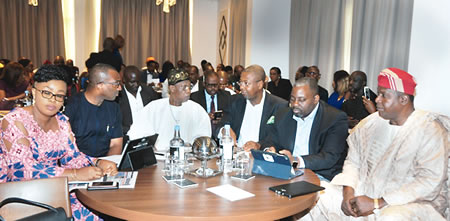AWARE of its limitations in achieving the lofty goal of transforming the nation’s creative industry to a creative economy, the Federal Government July 10, had a roundtable with players in the private sector.
“This administration has no doubt that the plan to transform the creative industry to a creative economy must be driven by the private sector. It is self evident that the modest growth that has been achieved in the creative industry so far, whether in films, music or fashion, has been achieved in spite of the government,” began the Minister of Information and Culture, Alhaji Lai Mohammed at the event, held at Renaissance Hotel, Ikeja GRA, Lagos.
“It therefore stands to reason that with the government providing the necessary enabling environment and the private sector in the driver’s seat, the transformation can be realized within a short time,” continued Mohammed who explained that the meeting was to seek practical solutions to earlier identified problems of the creative sector.
He added that the roundtable was the latest effort to wean Nigeria off reliance on oil and gave an update on his ministry’s initiatives at making the creative industry a mainstay of the nation’s economy. Mohammed disclosed that the Federal Government had signed a tripartite partnership with CNN and the UN World Tourism Organisation (UNWTO) to boost the creative industry using the film industry as a pivot.
“We are kick-starting the project with a 13-episode production showcasing the various stages in a movie production. These include the choice of location, which will allow us to showcase the various beautiful sceneries available in Nigeria; the choice of wardrobe that will show the rich options in the country’s fashion industry; the choice of sound track that will highlight our rich music genres, the casting that will showcase our abundant talents and the technical part that will provide the platform to show that there is no camera and other gadgets that we don’t have here. As part of the project, we will also run a programme on CNN showcasing the 20 Nigerians to watch in the industry. The Nigerians to be showcased would be selected by the industry players themselves to ensure authenticity.”
Citing global statistics, the minister reiterated that the creative industry is Nigeria’s new oil and that no stone would be left unturned in achieving this. He said: “Globally, the creative industry generated $2,250 billion in revenues (that is 3% of world GDP), according to a 2015 study by Ernst & Young on the economic and social contribution of cultural and creative industry around the world. The highest earners were television ($477 billion), newspapers and magazines ($354 billion) and visual arts ($391 billion). Revenue from creative industry exceeded those of telecommunications services (which comes in at $1,570 billion globally), and even surpassed the entire GDP of India ($1,900 billion).
“The creative industry generated 29.5 million jobs, which employs about 1% of the world’s active population. The top three employers are visual arts (6.73 million employees), books (3.67 million) and music (3.98 million). The creative industry also employs more people than the automotive industry in the United States, Europe and Japan combined.”
Not just a talk shop
Commendably and as earlier promised by the minister, the gathering that was later addressed by the chair of Heirs Holdings, Tony Elumelu, wasn’t just a talk shop, as participants broke into groups to proffer solutions to issues afflicting the creative industry.
Some of the issues highlighted by Kene Mkparu, of Filmhouse Cinemas, the government’s chief collaborator for the event and which participants suggested solutions to included, access to finance, regulatory institutions, taxation, infrastructure development, government incentives, access and enforcement, co-production treaties and capacity development.
However, given that it was just a day’s deliberations with several knotty issues to tackle, most of the groups while presenting their solutions requested for a two-week grace to properly highlight the solutions and their mode of implementation.
The access to finance group, for instance, suggested increasing the lifespan of interventions from government to 25 years, giving incentives to private investors, equity financing and using library contents as collateral.
The government regulation and piracy group recommended that the minister withdraw the Copyright Bill from the Ministry of Justice and present it to the National Assembly as an Executive Bill; revert the NCC back to the Ministry of Culture; establishment of a piracy trust fund, and resolve contradictions between the Nigeria Film Corporation and National Film and Video Censors Board
Obi Asika, who presented the report of the Infrastructure Development group, canvassed the creation of an asset register of government facilities including stadia that can be used as concert and screening venues. He said: “There are over 30 football stadia in the country. If we could hold concerts there and collect N1, 000 from 30,000 people that will give us about N30 million and we will not need to be charging N10, 000 for events.”
‘Involve the Bankers’ Committee’
Addressing the gathering, Elumelu whose Foundation signed an MOU with the Ministry of Culture last year, reiterated the importance of cooperation in the creative sector. He also touched on increasing capacity, making the sector attractive to investors and non-reliance on government intervention.
The former CEO of UBA, who expressed surprise at the figures quoted by Asika, also recommended that players in the creative sector meet with the Bankers’ Committee to educate members on how they can intervene in the sector. “You need to de-risk the sector and show its attractiveness. We need a market driven mechanism that allocates resources, not government subvention,” he stated.
Earlier, while welcoming participants, Director General of the Nigerian Tourism Development Corporation, Folorunsho Coker, highlighted the importance of the creative sector, saying “The creative industries are not a side story. Presently, this industry represents our largest asset, which is our human capacity and demonstrates our enormous potential.”
A number of private sector players, including Mo Abudu, Bolanle Austen-Peters, Biola Alabi, Chioma Ude, Peace Anyiam-Osigwe, Taofik Okoya, Gabosky and Tony Okoroji attended the roundtable. Others were Nimi Akinkugbe, Ituen Basi, Victor Okhai, Professor Bankole Sodipo, Ijeoma Onah, Zik Zulu Okafor, Mahmood Ali-Balogun and heads of parastatals in the culture ministry.





